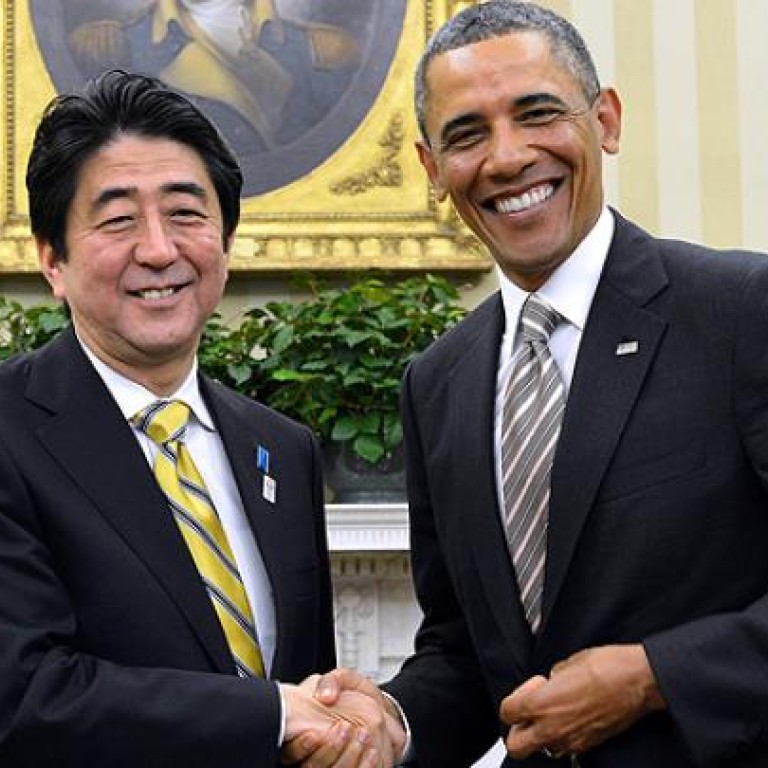
Abe, Obama firm on North Korea, measured on China
US President Barack Obama on Friday pledged with Japan to take a firm line on a defiant North Korea while apparently seeking to calm rising tensions between Tokyo and Beijing.
US President Barack Obama on Friday pledged with Japan to take a firm line on a defiant North Korea while apparently seeking to calm rising tensions between Tokyo and Beijing.
Obama promised to work closely with Japanese Prime Minister Shinzo Abe, who came to Washington in hopes of sending a strong signal of unity two months after his conservative Liberal Democratic Party swept back to power.
“You can rest assured that you will have a strong partner in the United States throughout your tenure,” Obama told Abe in the Oval Office, calling the alliance with Japan “the central foundation” for US policy in Asia.
Obama said the two leaders discussed “our concerns about the provocative actions that have been taken by North Korea and our determination to take strong actions in response.”
North Korea on February 12 carried out its third nuclear test, ignoring warnings even from its ally China. Recently released satellite images have indicated that North Korea has again resumed activity at the testing site.
Abe, who first rose to political prominence as an advocate for a tough line on North Korea, said he agreed with Obama’s position of not offering “rewards” to Pyongyang and on the need for a new UN Security Council resolution.
“We just cannot tolerate the actions of North Korea, such as launching missiles and conducting a nuclear test,” Abe said.
We just cannot tolerate the actions of North Korea, such as launching missiles and conducting a nuclear test
But the White House appeared to want to lower the temperature between Japan and China, which has increasingly sent vessels near Japanese-controlled islands known as the Senkaku in Japanese and Diaoyu in Chinese.
Obama did not mention the issue, hours after Beijing lashed out at Abe over a newspaper interview in which he charged that China would eventually hurt its investment climate through assertive actions in the region.
Abe said the US-Japan alliance was “a stabilising factor” and – in remarks he nudged his translator to read out – added: “We have always been dealing with the Senkaku issue in a calm manner and we will continue to do so.”
The exchange marked a different tone than one month ago, when then secretary of state Hillary Clinton warned China not to challenge Japan’s control of the islands, triggering a rebuke from Beijing.
Clinton, who was speaking with Japanese Foreign Minister Fumio Kishida, had also reiterated that that the United States considered the islands to be under Japan’s de facto control and therefore protected under a US security treaty.
On the eve of Abe’s visit, Obama’s top Asia adviser Danny Russel said the United States wanted to focus on diplomacy between Japan and China to avoid the risk of miscalculations between the world’s second and third largest economies.
“No one wants to allow tensions to fester or to escalate,” Russel said.
Obama called for further economic cooperation with Abe, who has pursued what the markets have dubbed “Abenomics,” which includes setting an inflation target and a sharply expansionary monetary policy.
“I know that Prime Minister Abe and I both agree that our number-one priority has to be making sure that we are increasing growth and making sure that people have the opportunity to prosper if they’re willing to work hard,” Obama said.
Abe, who was also prime minister from 2006-2007, is known for his outspoken views. While in the opposition in 2010, he said in a speech in Washington that China was pursuing a policy of “lebensraum,” the term Adolf Hitler used to refer to the “living space” he sought for Nazi Germany.
Since returning to office, Abe has been more circumspect in expressing his views – particularly on Japan’s wartime history, a topic that remains an open wound in relations with South Korea and China.
South Korea on Friday voiced anger after Abe’s government sent a low-ranking official to western Japan to take part in an annual rally that exerts Tokyo’s claims to another set of sparsely populated islands controlled by Seoul.
The United States has been hoping that Japan and South Korea will find a way to repair relations, particularly with new leaders in the two US allies. South Korean president-elect Park Geun-Hye takes office on Monday.
